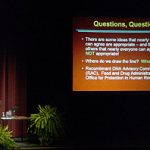Dr. R. Michael Blaese discussed his pioneering work in the field of gene therapy during a Voices of Discovery lecture Wednesday, March 2 in McCrary Theatre. Details...
 Blaese is president of PreGentis, Inc., and an adjunct investigator at the National Cancer Institute in Maryland. In 1990, he and his team successfully used gene therapy on 4-year-old Ashanthi DeSilva, who suffered from severe combined immune disease (SCID). She and another young patient are doing well today, yet Blaese said gene therapy is still in its earliest stages.
Blaese is president of PreGentis, Inc., and an adjunct investigator at the National Cancer Institute in Maryland. In 1990, he and his team successfully used gene therapy on 4-year-old Ashanthi DeSilva, who suffered from severe combined immune disease (SCID). She and another young patient are doing well today, yet Blaese said gene therapy is still in its earliest stages.
“It will probably be the middle of the century before gene therapy becomes standard,” Blaese said. Researchers must still solve many of the difficulties involved in successfully inserting new genes into a patient. The premise of gene therapy is to insert a gene into a diseased cell to correct the defect causing the disease.
Blaese said that every human being carries some mutated genes, but few of these result in disease. “There are no perfect genetic specimens. Everyone has between 5 and 50 significant genetic flaws,” Blaese said. More than 6,000 diseases have been shown to have some relation to the mutation of a single gene in the body.
As gene therapy advances, Blaese said researchers are faced with important moral and ethical questions about its appropriate uses. While helpful in the treatment of disease, Blaese pointed out that gene therapy can also be used to alter human characteristics, like eye color, height and hair color. “Society is going to have to give feedback and directives on where we should go with this.”
Researchers in the field also face a variety of obstacles in the approval of clinical protocols, Blaese said. In 1999, teenager Jesse Gelsinger died during a gene therapy trial at the University of Pennsylvania, resulting in a more complex approval process for clinical protocols. As a result, Blaese said some researchers are abandoning their efforts in the field.
“The consensus is that the restrictions on clinical protocols have grown, and many researchers are not doing them because of the time involved to get the protocols approved.”
The Voices of Discovery science speaker series, sponsored by Elon College, the College of Arts and Sciences, invites noted scholars in science and mathematics to Elon to share their knowledge and experience with students.


